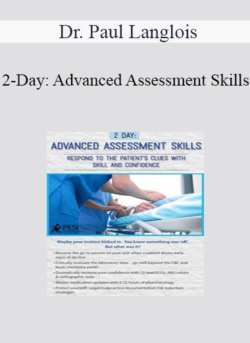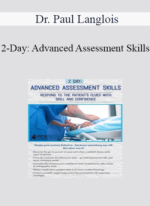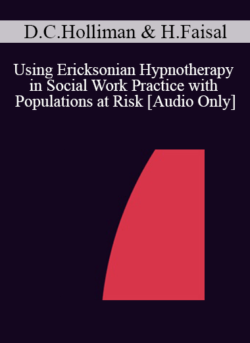[Instant Download] – Immediately deliver the download link after receiving the paymentPurchase Dr. Paul Langlois – 2-Day: Advanced Assessment Skills: Respond to the Patient’s Clues with Skill and Confidence courses at here with PRICE $439.99 $83Faculty:Dr. Paul LangloisDuration:Two Full DaysFormat:Audio and VideoCopyright:Apr 20, 2020 Manual – 2-Day Advanced Assessment Skills (69.5 MB) 309 Pages Available after Purchase Outline Psychosocial Assessment CALM acronym: How to set the person at ease during your assessmentThree key elements in determining the psychosocial assessmentProven ways to assess stress in the patientTwo ways to quickly identify suicidal ideationIs this an accident or abuse or neglect?General Survey of the Patient: What You See is What You Get…Well Not Always Symptom analysis…use the COLDSPA acronymWhat the blood pressure and pulse tell you about the patient…even before the stethoscopeFour proven ways to differentiate neuropathic and non-neuropathic painKey steps when a patient says that they have a condition you have never heard ofAre the patient’s medications causing the problem…check the Beers criteriaLook Into My Eyes Red-flags you must be aware of regarding the eyesHow medications affect the eye examDifferentiating visual acuity and visual fields…impact of the cranial nervesRespiratory System…Much More than Breath Sounds Three age-related changes in the lungs you must knowThe stethoscope is vital, but so are your handsHow to differentiate asthma, emphysema, pneumonia, and pleural effusionKeys to indicate the patient needs a chest radiographThe ABCs of ABGs: Four proven ways to contrast respiratory vs. metabolic acidosis and alkalosisFour other laboratory tests to assess lung functionMedications for pulmonary conditionsCardiovascular System…Beyond the HeartDetermine if that adventitious sound is during systole or diastoleMurmurs, rubs, opening snaps…what do they all mean?What does the ECHO cardiogram tell you?Identify the location of the ischemia, injury, or infarction based on the 12-lead ECGLaboratory tests for heart conditions…Heart failure, myocardial infarction, pericarditisPearls for a thorough peripheral vascular assessment…arteries, veins, and lymph nodesMust-know categories of medications that deteriorate the heartGastro-intestinal System…Beyond the Large and Small Intestine Don’t worry about this prevalent finding…it is age relatedGI laboratory tests that are vital for patient assessmentCould this be cancer or a normal finding?Four most-ordered GI procedures and differential diagnosisThe effect of medications on the GI tractGenitourinary SystemDifferentiate cystitis, UTI, and pyelonephritis…should medications be prescribed?”There is blood in my urine”; what you need to do right now for your patientGU laboratory test and procedures; how to interpret the resultsHow contrast dyes affect the kidney…watch out for these signsMusculoskeletal System”I have this back pain”; what you need to do now before the pain progressesDifferentiating muscular pain and nerve damageFive time-honored tests for the musculoskeletal systemMedications that facilitate fluidity in the MS systemNeurologic SystemDifferentiating two- and three-reflex arcsFour pearls when conducting cranial nerve assessmentIs this a motor or sensory problem?Two tests for meningitis which do not require cerebral spinal fluidTypes of seizures and the latest medication optionsFour deadly infections of the neurologic systemDoes your patient need an MRI, Positron emission tomography, or CT scan?Neurologic monitoring: Intraventricular, intraparenchymal, brain oxygen tensionAssessment of the Elderly Patient Head to toe differences in the assessment of the elderly patient”I can’t seem to remember…is this normal?” Cognitive alterations occurring as we ageThese laboratory parameters differ in the elderlyThe effect of medications on the elderlyRapid Assessment of the Decompensating PatientAMPLE acronym: A must-know to quickly and accurately gather patient information”I have pain”…the PQRST acronym is vital to help the patientGet these labs immediately for a crashing patientFaculty Dr. Paul Langlois, APN, Ph.D., CCRN, CCNS, CNRN Related seminars and products: 21 Dr. Paul Langlois, APN, Ph.D., CCRN, CCNS, CNRN, is a critical care clinical specialist in the Surgical, Medical, Neurologic, Burn, CCU and Trauma ICUs of Cook County Hospital, Chicago. Drawing on over 30 years of experience assessing and managing patients with life-threatening diseases, Dr. Langlois provides advanced-level training to nurses, physician assistants, nurse practitioners and physicians. Dr. Langlois received his Doctor of Nursing degree from Rush University in Chicago, Illinois.Dr. Langlois is committed to providing the highest quality of care to patients through advanced education. His presentations are evidence-based, timely and provide participants with case studies to facilitate critical thinking. As a bedside clinical nurse specialist, he has developed several institution-wide protocols for the multidisciplinary assessment and management of the cardiac, neurologic, septic, and multi-system organ failure patient.His presentations are enthusiastically delivered and offer practical tips that help make the most challenging concepts easy to understand. Linking knowledge to clinical practice is the goal of every educational program.Speaker Disclosures:Financial: Paul Langlois has an employment relationship with Cook County Hospital. He receives a speaking honorarium from PESI, Inc.Non-financial: Paul Langlois has no relevant non-financial relationship to disclose. Salepage: https://catalog.pesi.com//item/2day-advanced-assessment-skills-respond-patients-clues-skill-confidence-53628Archive: https://archive.ph/wip/inEkHPurchase Dr. Paul Langlois – 2-Day: Advanced Assessment Skills: Respond to the Patient’s Clues with Skill and Confidence courses at here with PRICE $439.99 $83
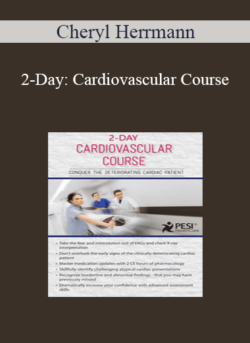 Cheryl Herrmann – 2-Day: Cardiovascular Course: Conquer the Deteriorating Cardiac Patient
₹13,778.00
Cheryl Herrmann – 2-Day: Cardiovascular Course: Conquer the Deteriorating Cardiac Patient
₹13,778.00
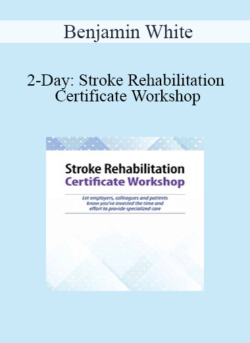 Benjamin White – 2-Day: Stroke Rehabilitation Certificate Workshop
₹13,778.00
Benjamin White – 2-Day: Stroke Rehabilitation Certificate Workshop
₹13,778.00
Dr. Paul Langlois – 2-Day: Advanced Assessment Skills: Respond to the Patient’s Clues with Skill and Confidence
₹13,778.00

